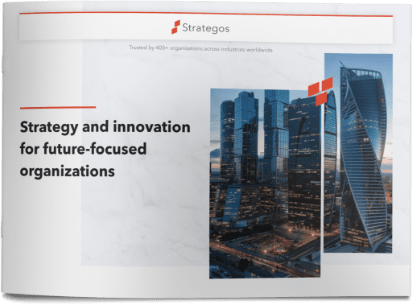Start preparing for recovery early and gain a competitive advantage
While COVID-19 is still impacting our society, the consequences for our economy are starting to become more visible. Not all companies will be able to survive, but history shows that those who come out winning started preparing for recovery earlier than their competitors. Those who haven’t prepared may survive the downturn but find themselves overtaken by their competitors as recovery gets underway.
The evidence for this includes studies from two previous global recessions. During the 1990-91 recession, twice as many companies made the leap from laggards to leaders as during surrounding periods of economic calm. A recent study by McKinsey looked at the performance of 1000 publicly traded companies through the last downturn of 2008-09 and found that 10% fared better than the rest.
Even though the cause of the current economic decline that we find ourselves in is in no way comparable in what caused it, the lesson learned is that you need to be, right now, preparing for recovery.
Budget reviews, efforts to increase efficiency and cutting costs are essential in addressing the immediate fallout from a crisis. But in some cases, companies have also stopped growth initiatives altogether misbelieving they can quickly be re-started in better times. This article shows you how to overturn that widely shared but potentially dangerous orthodoxy by preparing for recovery early.
Look for changes and recalibrate
Discontinuities are significant, fundamental changes that have the potential to change industry dynamics, redefine the rules of competition. They usually occur when combinations of different trends result in long-lasting modifications in the external landscape. If you can identify discontinuities earlier as well as exploit them better, you will be better prepared to compete for the future.
Start by assessing how the current crisis has affected the changes you were anticipating before the recession hit. An obvious one will be the acceleration of digitalisation and how that is impacting how we deliver value to our customers. Most companies will have had to shift to remote working and fast-forwarded their digital tooling to accommodate this change. One of our clients in professional services is seeing both opportunities and threats as a result. They can now deliver their services in new geographies without establishing expensive satellite offices. Still, equally, where they previously dominated locally or regionally, they are now seeing increased competition.
Lesson 1: analyse how recent events will change the external environment, impact the discontinuities you had previously identified or created new and unexpected ones you can harness.
Re-assess customer needs
Before COVID, you knew your customers’ needs. But these challenging times are likely to have significantly changed them, so relying on past studies won’t do. Consider the hotel industry, one of the most severely impacted sectors. Where most hotels are scaling down operations until guests return, some are seeing a longer-term shift in the benefits that their guests are seeking and provide a (safe) temporary space, a home-office hybrid to live and work for a few days or more. Some expect that high property prices and remote working will become the norm rather than the exception and lead to more people seeking residence in remote areas where living conditions are more favourable to their situation. We will see an impact on the demand for high-quality housing that includes enough space for a home office in new locations.
Lesson 2: identify new insights that capture the changed needs of tomorrow’s recession-battered customers or address new problems caused by the downturn.
Re-draw your industry ecosystem
Some of your competitors won’t survive the recession. Others will come out of it looking very different. New competitors, suppliers and customers will appear, with different business approaches. So business in the recovery won’t be like before. You’ll need to figure out how your industry ecosystem – all the participants involved in your business, from suppliers to competitors to potential partners – has changed and what those changes mean for you.
Even though more businesses are founded during favourable economic times history tells us there will be a flurry of entrepreneurial activity right after a crisis. The financial crisis, for example, gave birth to successful fintech innovation. Unemployment in the financial sector caused people to look for new opportunities. The wave of regulatory changes to avoid the problems that caused the collapse in 2008, consumers distrust in financial institutions and the introduction of the smartphone were key drivers in the Fintech revolution that followed. A slew of new players entered the market that are now well-known brands such as Transferwise, Revolut and Stripe, to name a few.
Lesson 3: economic downturns change the industry landscape. What changes could you anticipate and how would that impact your current business model.
Reinforce your core competencies
The core competencies of your organisation enable you to deliver unique value to your customers and differentiate yourself from your competitors. However, in difficult times, organisations often accidentally cut out some of the skills, processes, technologies, values and assets that make up their core competencies, causing an entire competency to weaken or even disappear.
Think about the cuts you made during this recession, and ask yourself: did we accidentally cut something that we will need as we move forward? Likewise, ask yourself if you will need new competencies to compete in the changed post-recession world. If the external environment has evolved, chances are you will need to change with it.
Lesson 4: assess how your companies strengths held up during the downturn. If a critical component is missing or weakened, address that gap so you can again provide unique value to your customers. Strategos co-founder Gary Hamel and C.K. Prahalad first introduced this concept in 1990. Watch this short explainer video by Harvard Business Review and find out why Core Competencies are important for strategists in large companies.
Watch here.
Preparing for recovery – will you be ready?
Preparing for the recovery when you are stuck in a health crisis and facing worsening economic conditions might seem like a waste of resources.
You are concerned about cutting costs and streamlining, taking actions that will help you survive the crisis. But it is likely that, right now, your closest competitor or some newcomer from outside your industry is figuring out a way to beat you. When we come out of recession, the market and competitive landscape will have changed, customers needs will have evolved, and you will need new competencies. Those who have prepared will do well, while others flounder. Will you be ready?While many companies are past the initial emergency response, they now need to start looking ahead as well. Business requires a proactive and agile approach to business performance to address the immediate future beyond the pandemic and create a minimum viable plan.
Read more here.




